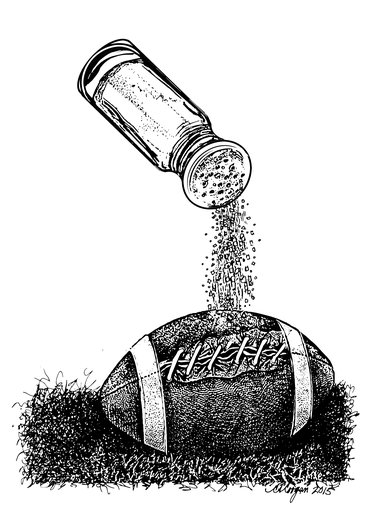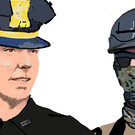Open talk reveals truth, can heal wounds
The corridor coursed with camaraderie last Tuesday night. For an hour and a half, as the Guilderland School Board members met behind closed doors to discuss the naming of the high school football field, those in the hallway outside lauded Coach Bud Kenyon.
The testimonials they gave were moving. Kenyon was not just a winning coach — in his 15 years at Guilderland, he never had a losing season, part of a 23-year streak — he shaped the lives of boys on the threshold of maturity.
More than one of Kenyon’s former players said the coach had made him a man. His supporters — including his wife and daughter and one of his sons — had gathered because Kenyon was on the cusp of receiving an honor that was being rescinded.
Last summer, the school board agreed, without dissent or question, to name the football field after Kenyon. Then, a week before the homecoming game when the field was to be dedicated, the board rescinded the offer.
Everyone, including the district’s superintendent, agrees the process was flawed. There was no policy in place that required a candidate be vetted before a school facility was named for him.
The week before the planned Sept. 25 dedication ceremony, board members were alerted to incidents from 40 years ago when Kenyon worked for Guilderland both as the varsity football coach and as a physical education teacher.
His family thought a wound they’d felt for decades was finally being healed but, in reality, the board was unaware of the incidents. The wound was made worse because friends and former players came from far afield to celebrate a coach they loved only to find the honor had been withdrawn.
“I wish a thousand times a day that we had uncovered this in July when we got the request,” said Wiles. “I said at the time we had no policy.”
The board’s policy committee has already met to develop a procedure, which bodes well for the future. But what about the present?
The incident lays bare a reality that journalists wrestle with every day: What is the truth?
It is certainly true that many young men and their families valued Kenyon not just for the way he taught the game, but for the way he formed the character of his players and for the way he brought the football community together.
One man told us how his youth was spent traveling from one foster home to another and in and out of juvenile detention. It was playing for Kenyon that made him believe in himself and turn his life to worthwhile purpose.
Another man told us how, at his first college practice, he thought he wasn’t cut out for college football. Who did he turn to in his moment of doubt? He called Kenyon, who listened. He went on to play four years of college ball.
But it is also true that the school leaders of 40 years ago thought some of Kenyon’s behavior was troubling enough that a rare 3020a hearing was held to try him on charges of insubordination and conduct unbecoming a teacher.
Kenyon has no shame about the two incidents that came to light and was eager to tell the board his side of the story. He pushed a boy back in his chair during a meeting in his office, he said, and he took a boy he described as a “peeping tom,” who hung out around the girls’ locker room, to the principal’s office by grabbing him by the seat of his pants and the nape of his neck.
Kenyon told us that, 40 years ago, the superintendent at the time had offered him a choice of writing a letter of apology for his behavior or going through the hearing. Kenyon took the weekend to go fishing — he said he does his best thinking that way — and decided to fight the charges. He believed he had nothing to apologize for. After the hearing, the charge for insubordination was dropped but Kenyon was reprimanded for conduct unbecoming of a teacher.
We couldn’t reach the long-ago students who may have been traumatized by this behavior. Did they feel frightened by what the hearing determined was “physical actions in excess of need?”
Those words are part of a written history — records that were eventually unearthed in the back of an elementary school basement. Besides being an argument for the importance of accessible records, those words stand as a testament to another truth.
Even though New York State didn’t pass a law banning corporal punishment until 1985, long after Kenyon left Guilderland, and even though the school district, by its own written admission, hadn’t properly trained faculty not to use forceful discipline, those words tell this truth: After a hearing, it was found force was used in excess of need.
Because the nine school board members chose to meet in closed session, we’ll never know the truth about how their decision was made. Had the board chosen to deliberate in public, as the law allows and as Kenyon no doubt would have preferred, we’d have a clearer understanding of the reasons to rescind the offer.
Was there talk, as there was out in the hallway, of the changing culture that allowed for more forceful discipline 40 years ago? Was there discussion about how winning ways may come from such discipline? Was there pushback that kindness is more important or that a teacher who is, by his very role, in a position of power should not use force?
Was there an assertion that people are imperfect and someone can be admired for his strengths despite his weaknesses? Was there then a response that naming a school field, a singular honor, should be reserved only for those who can serve as a beacon to all?
We’ll never know. We urge such transparency in the future. Citizens have a right to know the views of their elected representatives.
What light has been shed on the closed meeting comes from the superintendent; we commend her for her honesty in describing unfolding events. “Some hard lessons were learned by a lot of people. I think the board landed in the right place,” she said of not naming the field for Kenyon. “It’s bigger than celebrating football.”
But for those who want to celebrate football and, at the same time, honor the unambiguous best of Guilderland, there may be an answer. We found it in a thoughtful letter we received last week.
Gavin Warner wrote that the board made a good decision, not because Warner had anything against Kenyon. He wrote about the Guilderland football coach he most admired, Ed Farrell, who preceded Kenyon, and built Guilderland’s first winning team.
“Ed Farrell is as fine a gentleman as I’ve ever known,” wrote Warner. “He coached without bravado or histrionics. His players loved him.”
Warner goes on to say there’s no need to honor one coach over another.
We can’t undo the past, so it’s pointless to opine on what the board’s decision should have been, but we have an idea for the future: Instead of honoring one coach over another, why not honor them all?
Name the field “Coaches Field” and let each player, each alumnae or alumni, each community member who showed up to cheer on a Dutch team bask in the memory of the head coach or assistant coach they love best.
— Melissa Hale-Spencer



